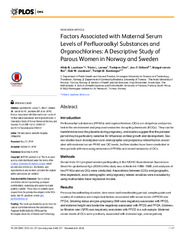| dc.contributor.author | Lauritzen, Hilde Brun | |
| dc.contributor.author | Larose, Tricia L | |
| dc.contributor.author | Øien, Torbjørn | |
| dc.contributor.author | Odland, Jon Øyvind | |
| dc.contributor.author | van de Bor, Margot | |
| dc.contributor.author | Jacobsen, Geir Wenberg | |
| dc.contributor.author | Sandanger, Torkjel M | |
| dc.date.accessioned | 2017-01-16T14:32:00Z | |
| dc.date.available | 2017-01-16T14:32:00Z | |
| dc.date.issued | 2016-11-08 | |
| dc.description.abstract | <b>Introduction</b><br>
Perfluoroalkyl substances (PFASs) and organochlorines (OCs) are ubiquitous and persistent
in the environment and proposed endocrine disrupting chemicals (EDCs). They can be
transferred across the placenta during pregnancy, and studies suggest that the prenatal
period may be particularly sensitive for influences on fetal growth and development. Several
studies have investigated socio-demographic and pregnancy related factors associated
with maternal serum PFAS and OC levels, but few studies have been conducted in
time periods with increasing emissions of PFASs and recent emissions of OCs.
<br><b>Methods</b><br>
Serum from 424 pregnant women participating in the NICHD Scandinavian Successive
Small-for-gestational Age (SGA) births study was collected in 1986–1988, and analyses of
two PFASs and six OCs were conducted. Associations between EDCs and geographic,
time dependent, socio-demographic and pregnancy related variables were evaluated by
using multivariable linear regression models.
<br><b>Results</b><br>
Previous breastfeeding duration, time since last breastfeeding period, sampling date and
country of residence were important factors associated with serum levels of PFOS and
PFOA. Smoking status and pre-pregnancy BMI were negatively associated with PFOS,
and maternal height was borderline negatively associated with PFOS and PFOA. Glomerular
filtration rate (GFR) was negatively associated with PFOS in a sub-sample. Maternal
serum levels of OCs were positively associated with maternal age, and negatively associated with previous breastfeeding duration and sampling date. Smoking had a consistently
negative association with PCB 118 in a dose-dependent manner. Education level,
pre-pregnancy BMI and alcohol consumption varied in importance according to the compound
under study.<br>
<b>Conclusions</b><br>
Several maternal factors, including potentially modifiable factors, markers of pregnancy
physiology and factors also related to perinatal outcomes were associated with EDC levels.
Results from this study are relevant to populations with still high PFAS and OC levels, i.e.
developing countries. Moreover, we can use this knowledge about associated factors on
emerging EDCs with similar properties. | en_US |
| dc.description | Original version at <a href="http://dx.doi.org/10.1371/journal.pone.0166127">10.1371/journal.pone.0166127</a><br>
Copyright: © 2016 Lauritzen et al. This is an open
access article distributed under the terms of the
<a href="https://creativecommons.org/licenses/by/4.0/">Creative Commons Attribution License</a>, which
permits unrestricted use, distribution, and
reproduction in any medium, provided the original
author and source are credited. | en_US |
| dc.identifier.citation | PLoS ONE (2016), 11(11):e0166127 | en_US |
| dc.identifier.cristinID | FRIDAID 1394659 | |
| dc.identifier.doi | 10.1371/journal.pone.0166127 | |
| dc.identifier.issn | 1932-6203 | |
| dc.identifier.uri | https://hdl.handle.net/10037/10164 | |
| dc.language.iso | eng | en_US |
| dc.publisher | Public Library of Science | en_US |
| dc.rights.accessRights | openAccess | en_US |
| dc.subject | VDP::Medisinske Fag: 700::Helsefag: 800::Samfunnsmedisin, sosialmedisin: 801 | en_US |
| dc.subject | VDP::Medical disciplines: 700::Health sciences: 800::Community medicine, Social medicine: 801 | en_US |
| dc.title | Factors associated with maternal serum levels of perfluoroalkyl substances and organochlorines: A descriptive study of parous women in Norway and Sweden | en_US |
| dc.type | Journal article | en_US |
| dc.type | Tidsskriftartikkel | en_US |
| dc.type | Peer reviewed | en_US |


 English
English norsk
norsk